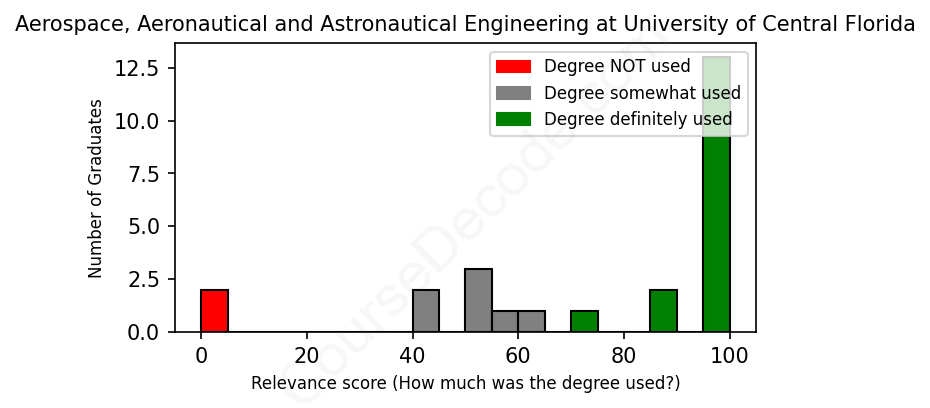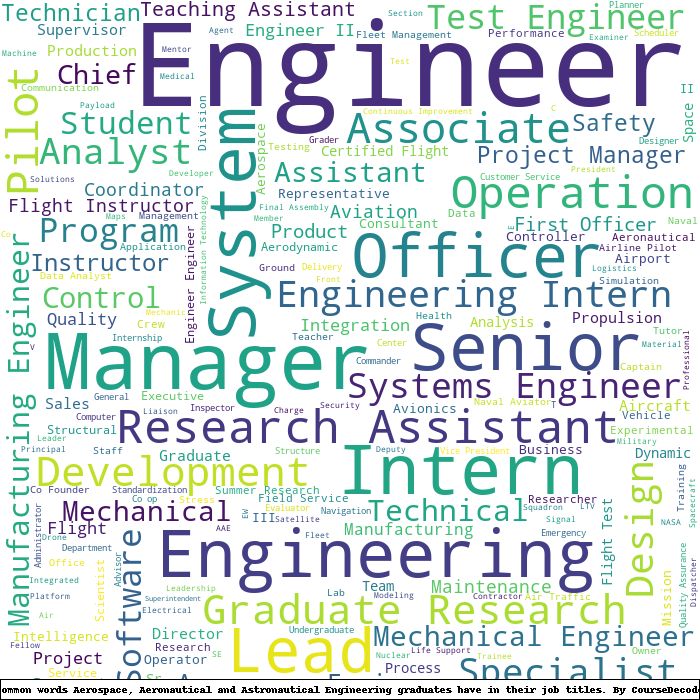
First, some facts. Of the Aerospace, Aeronautical and Astronautical Engineering graduates from University of Central Florida we've analyzed , here's how many have used (or NOT used) their degree in their career:

These are estimates based on AI analysis of 25 LinkedIn profiles (see below).
The verdict? Above average. Overall, with an average relevance score of 75%, Aerospace, Aeronautical and Astronautical Engineering graduates from University of Central Florida have a higher likelihood (+8%) of finding work in this field compared to the average graduate across all fields:
And for comparison, here's the chart for all profiles we've looked at across all degrees.
Also, after graduating, only 32% of these graduates have pursued further education other than another Bachelor's degree (such as a Masters degree or other), compared to the average across all profiles of 35%. This suggests a Bachelors degree is enough for most Aerospace, Aeronautical and Astronautical Engineering graduates, and it's normal to look for work straight after graduation.
See the details:
|
Relevance score: 100% We think this person has gone into a career highly relevant to their degree. We think this person has gone into a career highly relevant to their degree.
DEGREE INFOGraduated in 2016 from University of Central Florida with a Bachelor's Degree in Aerospace, Aeronautical and Astronautical Engineering. No other secondary education since. JOB HISTORY SINCE GRADUATIONSystems Engineer Rotational Assignment NASA - National Aeronautics and Space Administration Jan 2019 - Apr 2019 Aerospace Test Engineer  Naval Air Warfare Center Training Systems Division (NAWCTSD) Feb 2017 - Apr 2021 Lead Test Engineer  Naval Air Warfare Center Training Systems Division (NAWCTSD) Apr 2021 - Present Branch Head  Naval Air Warfare Center Training Systems Division (NAWCTSD) Mar 2023 - Present ABOUTNo information provided. |
The top 10 most common jobs done by the graduates we've analyzed (ranked most common to least) are:
So, when you look at the job choices made by graduates from the Aerospace, Aeronautical, and Astronautical Engineering program at the University of Central Florida, you'll notice a mix of positions that are either strongly related to their studies or not at all. A lot of graduates ended up in roles like Aerospace Engineer, Systems Engineer, and Test Engineer, especially at notable companies like NASA, Lockheed Martin, and Boeing, where they can really dive into the technical skills and knowledge they learned during their degree. These kinds of jobs directly tap into what they studied and require a solid understanding of aerospace engineering principles.
However, there's also a noticeable number of graduates who ventured into fields that aren't all that relevant to aerospace, such as real estate, retail, and various general engineering roles. For example, some went on to work as realtors or in IT roles that don't really utilize any aerospace knowledge. While it’s great to see graduates finding employment in diverse fields, those positions might not make the most of their specialized education. Overall, many graduates managed to land positions that are closely tied to their engineering background, but it's interesting to see that a good chunk also ended up in areas that diverged quite a bit from aerospace. It's a mixed bag for sure!
Here is a visual representation of the most common words in job titles for Aerospace, Aeronautical and Astronautical Engineering graduates (this is across all Aerospace, Aeronautical and Astronautical Engineering graduates we've analyzed, not just those who went to University of Central Florida):

When you look at the career trajectories of graduates from the Aerospace, Aeronautical, and Astronautical Engineering program at the University of Central Florida, it seems like many of them have found their way into solid jobs related to their field after graduation. For their first jobs, a good chunk of them tends to start off in engineering roles, like systems engineer and aerospace engineer positions, often at major companies like Lockheed Martin, NASA, and Boeing. This suggests that right out of school, they're landing jobs that leverage the skills and knowledge they gained during their degree, which is pretty promising!
Fast forward five to ten years, and it looks like a lot of these graduates continue to move up in their careers within the aerospace industry. Many of them are climbing the ranks to hold positions like lead engineers and even branch heads in significant organizations. However, there are a few outliers who have ventured into unrelated fields, like real estate and retail sales, which shows that not every grad sticks to aerospace. Overall, though, it appears that most UCF graduates are successfully navigating fulfilling careers within their field, making them a part of the exciting and ever-evolving world of aerospace engineering.
Pursuing a Bachelor’s degree in Aerospace, Aeronautical, and Astronautical Engineering is generally considered pretty challenging, and it’s no different at the University of Central Florida. You’ll dive into heavy math, physics, and a bunch of engineering principles, so if you’re not super comfortable with those subjects, it can feel pretty intense. There are definitely some tough classes, and you’ll probably find yourself spending long hours in the library or working on projects, especially when it comes to team dynamics in lab settings. It’s not impossible, and tons of students succeed, but just know that it’ll demand a solid work ethic and a passion for the field to keep your head above water!
Most commonly, in the LinkedIn profiles we've looked at, it takes people 4 years to finish a Bachelor degree in Aerospace, Aeronautical and Astronautical Engineering.
From what I can see, most of these University of Central Florida graduates seem to be doing pretty well for themselves, especially considering they went into fields like aerospace and engineering, which typically pay decently. Some have climbed the ranks quickly—like the 2016 grad at NASA and others now at big names like Lockheed Martin and Northrop Grumman—indicating a solid salary trajectory and likely good benefits. However, there are a few instances, like the 2010 grad who transitioned from real estate with no clear indication of high earnings, that might suggest not everyone is making that bank. Overall, though, a lot of them appear to have good job stability and growth potential, which is a positive sign for their financial futures!
Here is a visual representation of the most common words seen in the "about" section of LinkedIn profiles who have a Bachelor degree in Aerospace, Aeronautical and Astronautical Engineering (this is across all Aerospace, Aeronautical and Astronautical Engineering graduates we've analyzed, not just those who went to University of Central Florida). This may or may not be useful:

Here are all colleges offering a Bachelor degree in Aerospace, Aeronautical and Astronautical Engineering (ordered by the average relevance score of their Aerospace, Aeronautical and Astronautical Engineering graduates, best to worst) where we have analyzed at least 10 of their graduates:
| College | Score | Count |
|---|---|---|
 Texas A&M University Texas A&M University
|
87 | 22 |
 California Polytechnic State University-San Luis Obispo California Polytechnic State University-San Luis Obispo
|
86 | 12 |
 University of Cincinnati University of Cincinnati
|
86 | 10 |
 Purdue University Purdue University
|
85 | 40 |
 Rensselaer Polytechnic Institute Rensselaer Polytechnic Institute
|
85 | 17 |
 Georgia Institute of Technology Georgia Institute of Technology
|
84 | 23 |
 Liberty University Liberty University
|
81 | 21 |
 Iowa State University Iowa State University
|
80 | 16 |
 University of Colorado Boulder University of Colorado Boulder
|
80 | 13 |
 California State Polytechnic University-Pomona California State Polytechnic University-Pomona
|
79 | 13 |
 United States Naval Academy United States Naval Academy
|
77 | 12 |
 The Ohio State University The Ohio State University
|
76 | 20 |
 University of Central Florida University of Central Florida
|
75 | 25 |
 Arizona State University Arizona State University
|
74 | 12 |
 University of Michigan University of Michigan
|
74 | 10 |
 Embry-Riddle Aeronautical University Embry-Riddle Aeronautical University
|
71 | 163 |
 Penn State University Penn State University
|
68 | 12 |
 Florida Institute of Technology Florida Institute of Technology
|
67 | 20 |
 The University of Alabama in Huntsville The University of Alabama in Huntsville
|
67 | 11 |
 Embry Riddle Aeronautical University-Worldwide Embry Riddle Aeronautical University-Worldwide
|
66 | 10 |
 University of Illinois at Urbana-Champaign University of Illinois at Urbana-Champaign
|
48 | 10 |